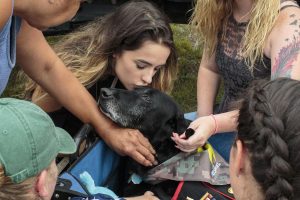Veterinary researchers at Mizzou have had such success with a new immunotherapy approach for bone cancer treatment in dogs, the results have now helped secure FDA approval to test the method on human brain cancer patients.
Therapy To Treat Bone Cancer
June 26, 2020

In collaboration with the biotech company ELIAS Animal Health, scientists treated 14 dogs with a personalized vaccine made from each dog’s cancer cells. They then boosted the animal’s immune response by removing the dog’s own white blood cells, growing them in a lab, and then reinjecting them into the dog to attack the tumors. Early results suggest the treatment allows dogs to live longer than standard care.
“It’s very clear that the approach caused an immune response that extended these dogs’ lives substantially,” said principal investigator Jeffrey Bryan, a professor at the University of Missouri’s College of Veterinary Medicine.
Currently, the average dog with osteosarcoma will live four to six months if the tumor is removed surgically and up to a year if the surgery is followed up by chemotherapy.
But immunotherapy trains the body’s own immune system to recognize cancer and attack it, stopping the spread of cells gone rogue.
One way to do that is to inject a patient with a vaccine made out of the patient’s own tumor cells. Cancer cells collected during the surgery are sterilized and irradiated to make sure they cannot divide further, mixed with potent chemicals producing a strong immune response, and injected back into the patient’s body. Over the next several weeks, the patient’s immune system starts to produce immune cells that are trained to recognize cancer with great precision.
Compared to an average survival time with amputation and chemotherapy, the dogs that underwent Bryan’s treatment lived several months longer. Five lived for over two years after they started their treatment.
It is still too early to tell precisely how much better this treatment is compared to standard care, but ELIAS is enrolling canine patients to test the therapy in a big trial with centers across the country.
Dogs’ and humans’ immune systems are uncannily similar. Tumors in both slowly condition their hosts’ immune systems to ignore them as they grow in size, said Bryan, the principal investigator. So using a patient’s own cancer cells as a vaccine to stimulate the immune system should translate between humans and dogs, he said. And, theoretically, if tumor cells have enough mutations to be recognized by the immune system, any type of cancer could respond to the treatment.
Bryan’s study helped convince the FDA to allow testing of this type of therapy in human patients with glioblastoma multiforme, a rare and aggressive form of brain cancer that is very difficult to treat.
Bryan said that Mizzou’s Comparative Oncology veterinarian group is interested in advancing technologies that not only can help companion species with their cancer, but also have the potential to help humans.
“We were very excited to partner with ELIAS on this and to help move the whole technology forward,” said Bryan. “[The study] turned out I think better than many of us have even hoped and we were really pleased with how well these dogs have done”.













